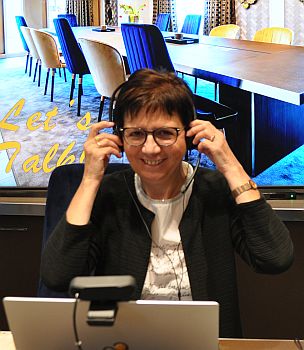Editorial
Dear Insiders,
The cancellation of Expo Real one and a half days before the start this Monday evening was a shock. Not even a virtual conference took place. The hotel and hotel real estate experts are thus missing an important multiplication platform in order to explain their fears of survival this year. Our co-exhibitors were likewise infinitely disappointed as they also saw the fair as an encouraging event, they wanted to take part in.
From the reactions we got, we discerned one particular wish: we need to talk! Overnight, we organised a Zoom meeting and 35 heads from the industry exchanged ideas for about two hours. Stefan Rummel, Managing Director of the trade fair, and Claudia Boymanns, Head of Expo Real, also spontaneously agreed to join the video call: a gesture of appreciation towards the industry, which had enriched the trade fair with an attractive and lively segment over the past ten years.
Rummel provided answers. Due to the accommodation ban and Munich's red zone label, many unsettled visitors, speakers and entire booth teams refused to come. When asked why the digital part had been cancelled as well, he explained, that it would not have been possible to convert all events to a purely digital format. Until the next Expo Real, the trade fair aims at drastically increasing its digital maturity in order to be able to offer an attractive digital complementary programme for the regular trade fair in 2021.
Hoteliers were particularly angered at the politicians because of the most recent accommodation bans: since then, there has been a flood of cancellations and the businesses are once again facing almost zero turnover. The frustration alone about this was enormous among our 35 Zoom guests, as well as the inability to get urgently needed help for the hotels underway, which has been going on for months. In connection with the rigid attitude of many landlords, things are becoming a matter of survival for many. "By 2023/24, not a single hotel chain will survive this state," warned one of the participants. Susanne Stauss diligently took notes while I was moderating the talk.
Insolvency lawyer Dr. Matthias Hofmann also participated in the video call. In a separate article today, he and more colleagues explain what the amending law will change on January 1, 2021. However, none of them have insolvency applications on their tables at the moment. This is the calm before the storm: Everybody is certain that they will come starting in January.
Balm for the souls of hoteliers was provided yesterday: In Baden-Wuerttemberg and Saxony, the accommodation ban was overruled; in the first federal state by court, in the latter by the Minister President himself. On Wednesday, "Mutti" Merkel was not able to budge her stubborn "children", the federal states, to an agreement. They talked for eight hours – and subsequently postponed the continuation until November 8. Here, federalism becomes a farce and a danger for the economy. By postponing this decision, the government obviously wants to stop any travel activities – and is thus ruining the entire travel industry knowingly.
It remains dangerously exciting, also concerning open-ended real estate funds, whose hotel commitment is examined carefully by Beatrix Boutonnet today. Currently, they regard this asset class hotel more critically, but they do not want to do without it.
From the news: The world looks very grim for the Swiss hotel industry. A professor provides concrete suggestions, which sectors of the real estate world could be analysed via AI. China is slowly reporting back as a travel-keen source market. This should please luxury hotels, such as the just re-opened Mandarin Oriental in Munich.
After the cancellation of Expo Real it is even more important to assess the market situation. Take part in our annual investment BAROMETER in cooperation with Union Investment. We have prepared 3 questions on the mood and 2 questions on the assessment of future developments: What else speaks in favour of the asset class hotels in the future and what scenarios result from the shrinking pipelines? Help us, join us: Click & Go!
Yours, Maria Pütz-Willems
Editor-in-chief
Your opinion? maria[at]hospitalityInside.com
Dear Insiders,
Next Wednesday/Thursday, we’ll be back at Expo Real. Nothing will be like it was. HospitalityInside will be the only "hotel platform" present, with 15 physical and virtual co-exhibitors keen to show that the hotel industry has every desire to and will live on. Take a look at our page 1. There you will also find a video explaining how Expo Real Digital works.
We also publish the Trade Fair's Hotel Conference Programme on our homepage today: This year, there will be just four instead of the usual six discussion rounds. As a result, only crisis-tested experts will speak. Among other things, they will focus on the operator black box, on owners and leaseholders as well as on insolvencies and third-party use. And separately, there will be another round on innovation in the asset class Hotel.
Despite the many changes, one thing will stay the same: Together with Union Investment, we are launching the annual "Investment Barometer" today, in the Expo Real context. We want to know what factors stand in favour of the asset class Hotel and what scenarios arise as the pipelines now shrink. The sector needs reliable guidance. Join us! More information is provided on our page 1! You can start right here: Click & Go!
The situation "out there" is serious. Austria has been on red alert since the RKI issued a warning for Vienna. Now, every second hotel faces collapse. Thanks in particular to the German travel warning! Fred Fettner sums up the desperation and provides concrete figures.
Hoteliers have been fighting Booking.com for years, now it's Booking's turn to defend itself: Three new reservation platforms from the Netherlands and France are now on the market - with lower and even zero commissions. Sarah Douag takes a serious look at Beterboeken, Fairbooking and leboncoin and interviewed them.
Covid-19 had silenced Fridays For Future. As of recently though, Greta and her friends are back on the streets demonstrating again. And that’s good! People must be reminded of sustainability. This is why we are pleased to present the Sustainable Hospitality Alliance today; until recently it was called ITP/International Tourism Partnership. Under the auspices of the alliance, 14 chains exchange information with each other, and the new website shares sustainability expertise with non-members. Chairman Wolfgang Neumann explains the changes – at a strategically important time.
Transaction figures for the 3rd quarter in Germany are here - and they made sobering reading! In response, Art-Invest has launched a new hotel fund. It targets hotel real estate untied by lease agreement for possible takeover of hotel management. In Spain, where the industry is lying idle, there is a struggle as to how to provide social security for the unemployed. A similar dilemma is emerging in Hungary, as a market analysis shows. In contrast, there's jubilation on the Bürgenstock near Lucerne: The extensive luxury resort owned by Katara Hospitality will host the World Economic Forum in May 2021.
And finally, we bring you a whole range of personalia today: Corona has really got the personnel carousel spinning - with dismissals. Accor has also restructured its regions. Duncan O'Rourke is given even more responsibility and now has a - more important - voice in Paris.
Today I'm determined not to focus on the week's adversities - from the "patchwork” of restrictions in Germany, recalcitrant federal states and clueless politicians keen to place even greater demands on the everyday workings of an industry already under intense strain. No. Today, I look forward to the personal talks and encounters I will have in Munich next week and to the odd social glass of wine while I'm there.
Yours, Maria Pütz-Willems
Editor-in-chief
Your opinion? maria[at]hospitalityInside.com
Dear Insiders,
Premier Inn wants to optimise in Great Britain and expand in Germany. After the most recent capital contribution, nearly two billion pounds in cash are available. But Premier Inn knows that this is no carte blanche. The largest British chain has adjusted various screws. Unimpeded by Covid-19, Germany should become the market to contribute significantly to Whitbread's profit in future. This means: outright expansion.
Cash can make deals happen. Investment partners, suppliers and staff members understand this message. Managing Director Mark Anderson explains the course of action.
Also this year's business travel analysis of VDR suggests companies take a new course: start up business travels again. Otherwise, the economic power will lose 17%. This will increase the current misery even more. The data for 2019 are splendid; therefore, the fall into the corona abyss shows up even more blatantly. Nevertheless, the VDR does not regard the development in the hotel industry as pitch black. First companies are allowing travels again. Keep it up!
We all say that we will learn to live with the virus. But we aren't doing that. There will still be no absolute safety in 2021, with or without a vaccine.
The dwindling enthusiasm for the industry was evident last week among well-known investors: Colony Capital, which is selling all hotel portfolios, and Credit Suisse, which is selling its assets piece by piece.
Accor is expanding its Benelux portfolio, Plateno Europe's hotels joined the umbrella of Louvre. And Anbang, and the Chinese insurance group, which wanted to alienate Marriott International of Starwood Hotels some time ago, has vanished into thin air. And Airbnb has activated its "City Portal" shortly after the most recent EU verdict – coincidence or not? This and more in a colourful edition.
Expo Real Hybrid: There are only 12 days left until the trade fair starts, and the doors remain wide open for digital exhibitors. You still have the opportunity to co-exhibit with us for a smart price. We enable targeted meetings and networking, virtually and physically off the fair. More info on our page 1.
Yours, Maria Pütz-Willems
Editor-in-chief
Your opinion? maria[at]hospitalityInside.com
Dear Insiders,
The virus is now slowly beginning to show its ugly face in economic life. In Germany this week, two renowned private hotels announced their own shut-down: the luxury hotel Hessischer Hof in Frankfurt and the lifestyle hotel Anna next to the Königshof in Munich, also operated by the renowned Geisel family. The reason: minimal earnings, horrendous costs.
At the same time, the following news fluttered on to my desk: The Swiss shipping company Scylla will dock for the first time in Frankfurt am Main with its river cruiser MS Robert Burns, which has 88 cabins for 176 guests: The presence of the ship "will expand hotel capacity in Frankfurt and offers travellers exactly the right location to explore the city", the PR agency states cheerfully. Munich Airport is now also to have an event and congress arena with hotel and multi-storey car park. Up to now, the project for 200 million and 20,000 guests had been kept under wraps.
That really is satire. Given such constellations, hotel lobbyists would really have to get to work and get round the table with town planners and city councils.
As of this week, one by one all hotels will close on the Balearic Islands, a catastrophe for both people and industry. Hotel entrepreneurs, tourism experts and politicians are coming together there.
No matter who I spoke to over the last two weeks, whether they were in the UK, Spain, France, Germany or Austria... All that everyone wants is a reliable framework to be able to edge forward as a company. Frustration surrounding the quarantine rules imposed from one moment to the next and about the surprising lockdowns make even the most cautious planning obsolete - and with it any approach in adjusting to the new normal in our economic lives. At present, 14 of 27 EU countries are designated, in whole or in part, as corona risk zones.
Restrictions for all are not a solution. Incidents like the one that occurred at the École hôtelière de Lausanne this week clearly show this: Eleven infected students - presumably young party-goers - have meant that 2,500 fellow students have to go into quarantine and three quarters of the university to online classes. If appeals to reason no longer count, there must be targeted sanctions in future.
It is becoming increasingly difficult to be patient in the face of these developments. We’re on hand to help today with interesting contributions: a long interview with TUI Hotel CEO Sebastian Ebel about changes that, for me, are more nebulous than transparent; about the ECJ ruling on Short Rental, which gives all Airbnb enemies cause to celebrate; and about the tricks and deceptions in the speaker scene, which is also firmly established in the hotel industry. Finally, a non-corona theme, and a very entertaining one too.
Bitterly serious are once again the updates on the latest bridging aids in Germany, which are already failing to help medium-sized hotel groups again. We also bring news on the new draft of the reorganisation and insolvency law, which, among other things, discusses interventions in tenancy and leasing agreements.
While Whitbread in the UK may have to lay off up to 6,000 employees, Premier Inn's plans in Germany remain unchanged. Meanwhile, a class action lawsuit against "Corona-Ischgl" is being put together by those affected.
And last but not least: If you want to meet, exchange and network around Expo Real, take part in our new HospitalityHub at the Apartment Hotel MaSeven! Here’s the link to the new idea.
Till next Friday!
Yours, Maria Pütz-Willems
Editor-in-chief
Your opinion? maria[at]hospitalityInside.com
Dear Insiders,
How tricky travel warnings and "red" zones are, a consultant from Vienna told me yesterday: Anyone travelling by train from the high-risk area of Vienna to Germany must expect controls and possibly also fines if they cannot present a Covid-19 PCR test and, in some cases, a quarantine requirement. Yet those who travel from Salzburg to Munich are subject to no such restrictions. Travellers flying to Germany from the airport Vienna-Schwechat are not checked anywhere: The Austrian airport is not located in Vienna, but in Lower Austria.
Thanks to RKI, Germany's Robert Koch Institute, Vienna and the whole of Austria are now on red alert: two days after Vienna was declared a risk area, a spontaneous survey among the members of the Austrian Hotel Association ÖHV revealed: The hotel industry is on the verge of collapse!
The association's figures: Across Austria, occupancy rates will fall from a low 50% to a disastrous 38% in the next four weeks, and in the cities from the already far too low 35% to 23%. Keep in mind that many companies have already closed down. Only 51.8% say that they will be able to keep their business running for more than six months if business develops as it has now, compared with just 30.4% of the city hotels.
Politicians must now speak plain language, free themselves from the dictate of virologists and allow more targeted testing to be carried out more quickly. Spontaneous bans and constantly changing traffic lights are no solution. People need planning security, freedom of movement in a reliable framework. Entrepreneurs can do NOTHING. Even business travellers would still accept clear announcements and guidelines for trips to China, Spain or elsewhere - because they could plan it.
Six months after the outbreak of the virus, the current measures no longer bear any relation to the causes. Politicians who do not act now are killing the economy and healthy people.
The Salzburg Festival in August proved what motivated people are capable of even under difficult conditions. It is fascinating to read how, despite corona restrictions, 76,000 visitors and 110 performances in eight venues are managed right through from the booking to how guests make their way home. Hats off! Sylvie Konzack spoke with the makers, as well as with the bosses of Estrel Berlin, who are also successfully implementing larger events with 1,000 people. The Berlin congress market recently generated EUR 2.63 billion in revenue and employs 44,000 people full-time!
All cities, including Berlin, are struggling - and this is true across the entire value chain. This is why hotel entrepreneur Michael Zehden of Ahlbeck & Zehden came up with the idea of a "support loan". EUR 700 million from the state are be allocated to help the 800 accommodation providers over the worst; the money is to be repaid over 10 years through a 3 percent surcharge which guests will have to pay. In this case, the glass of wine will then cost EUR 6.18 instead of EUR 6. Or an overnight stay EUR 77.25 instead of EUR 75. How the active Berliner imagines this will work, he told us yesterday. By the way, this suggestion comes again from an entrepreneur, a man of practice. Zehden is in talks with Berlin’s mayor and other party leaders.
Meanwhile, behind the scenes, the hotels continue to fight for their leases, wait for the next announcement on insolvency law and listen closely for news from the Robert Koch Institute... The mood is not good, as was in evidence at the 12th Hogan Lovells Hotel Day. The hotel experts addressed current pitfalls quite openly. Hope for new good times could only be heard through the ice cubes in the lime green aperitif, which everyone held up with a despairing smile into the PC camera at the end of this virtual exchange... A toast to chaos!
Last but not least - our joint stand at EXPO REAL has grown to 15 co-exhibitors. The Marketplace on our website will keep you up-to-date on our activities around Expo Real, the HospitalityHub and the joint stand. If you decide in the next weeks to take part in Expo Real, you can still join us.
Yours, Maria Pütz-Willems
Editor-in-chief
Ihre Meinung? maria[at]hospitalityInside.com
Dear Insiders,
Last week, our correspondents reported on their experiences of holiday this summer and how corona has had an impact. Today, it's the turn of the hoteliers and hotel groups, including Baur au Lac Zurich and the Bürgenstock Resort Lake Lucerne, the Wellness Hotel Hochschober in Carinthia, Travel Charme, Seetelhotels, Romantik and Preferred Hotels. We also bring you voices from Berlin, Frankfurt, Munich and Hamburg.
The corona summer of 2020 was colourful and weird in a peculiar sort of way. Some achieved significantly higher rates and are delighted with a high level of pre-bookings in autumn. The resorts are also concerned about the coming darker months, but it's the cities where worries strongest. Only Hamburg seems to be doing better. Take a look at this great potpourri of reports from day-to-day business life.
Our correspondent Fred Fettner has been pouring over this year's summer statistics from Austria: There are only individual cheers. There too, the cities are taking a battering, while on the lakes, efforts already need to be made to stop unregistered camping. The situation in Italy looks much more bleak; in comparison Massimiliano Sarti's sober summer figures should make the German-speaking countries feel happy and grateful.
China has already overcome the crisis, almost all planes are back in the air, vaccinations have begun. And they will then also travel to Europe again, but with new demands: They now demand quality, no more mass destinations, more local flair and preferably hotels with family feeling. And they are prepared to pay more for it. Prof. Wolfgang Arlt, sinologist and China insider, sees a paradigm shift in the beginning. Time for a reorientation towards China.
The investment climate study by Union Investment shows just how sought-after logistics and healthcare are for investors. And it provides figures to back this up. The word 'Hotel' makes an appearance nowhere, nor does it in the digitisation study by ZIA and EY. Nevertheless, both studies provide valuable information on the current trends of the overall market.
The German hotel market is on the verge of despair, as the September survey by Dehoga shows. No wonder, when six months after the start of corona, this industry still has the feeling of not being understood and abandoned by politics. Some of the hoteliers and hotel groups mentioned above also openly criticise the lobbyists and politicians.
Necessity has made Scandic Hotels inventive: Within three weeks, they created a transnational network for co-working spaces from existing resources.
We remain creative. The new "marketplace" of the World of Hospitality is now online on hospitalityInside.com and will be gradually filled with the profiles of the partner companies and other content in the coming weeks. And on our page 1 we will also keep you up to date with the latest developments around the Expo Real Hybrid Summit.
Yours, Maria Pütz-Willems
Editor-in-chief
Ihre Meinung? maria[at]hospitalityInside.com
Dear Insiders,
"German Angst” is making the rounds. And it has the face of the Robert Koch Institute. As of Wednesday evening, the Institute has placed the whole of Spain on its travel ban. Who will stop this policeman of global tourism? Nobody, not even Spanish hoteliers, wishes to play down the rising infection rates, but as more is known about how to deal with risks, a more differentiated approach is expected with proportionality in terms of the measures imposed - in particular as the pandemic is developing differently in each country and even within each country.
Every individual and every destination has a right to be treated fairly. Yet it is becoming increasingly clear, especially in the case of Spain, the favourite destination for German and British tourists: The RKI has simply removed the say of entire industries and all travellers worldwide - out of pure fear that case numbers in Germany could increase. How selfish.
Super-spreader events like family celebrations or beach parties should be forbidden, no doubt about it. But control over these sort of things is not achieved by generalized travel warnings. All this achieves is that entire countries and populations are plunged into an economic and human catastrophe with far-reaching social consequences. The debate surrounding deaths caused directly through the pandemic and deaths caused indirectly from the economic consequences of the pandemic needs to be intensified. Where is the German Ethics Council?
Beatriz de Lucas reports from a press conference held in Madrid last night, two hoteliers from Tenerife and Mallorca describe their disastrous everyday life under the ban.
Six of our authors have stories of their own holidays over the corona summer 2020: They bring us verbal images of the perfectionism as well as the sloppiness of some hoteliers and restaurateurs in the application of hygiene measures and social distancing. The reality is bitter, more sad proof of how uncoordinated the implementation of hygiene and social distancing measures are across the EU.
What else happened in August? The World Economic Forum in Davos for January has already been cancelled, making the world wait even longer for politicians and economic experts to exchange views more closely. Yet another important event to be lost. What will happen to ITB 2021? And all the other mega-events?
Futurologist Andreas Reiter, who gave me a video interview which we will make available for all users on our page 1 today, remains optimistic: After after we were locked up this year, we will take back our freedom in 2021, in big adrenaline jumps and at mega-festivals. But it won't be a return to the mass tourism of old.Digital tools will steer people in smarter ways. But travel will remain! There is no substitute for this experience.
The autumn will be hot because of the still outstanding financial aid, the expected wave of insolvencies and a changing operator landscape. The two managing partners of the consulting firm Treugast analyse the hotly contested German market, talk about winners, losers, new financing vehicles and many other shifts and changes. This interview also shows the confused, uncertain times we live in. Individual entrepreneurs such as Dirk Iserlohe, member of the supervisory board of Dorint Hotels, never tire of approaching politicians with specific problems and proposing solutions. But he is the exception.
After our summer break, it feels as if the industry has fallen into a second paralysis. Hardly anyone wants to comment. For fear of a second wave, of their own insolvency, a bruised ego, damage to the company's image? German Angst is making the rounds.
Our packed edition today contains even more discussion material - about France, the development status of the vaccine, the Dehoga figures and the interim financial statements from the chains.
And we invite you to join us at Expo Real in mid-October: The wheel will continue to turn, and today we offer you a moderately priced special package for a physical and virtual presence in the vicinity of the trade fair: the MASEVEN Hospitality Hub. More on this on our page 1.
Yours, Maria Pütz-Willems
Editor-in-chief
Ihre Meinung? maria[at]hospitalityInside.com
Dear Insiders,
The wounds inflicted by corona in the first half of the year are clear to see - the negative results posted by the most successful hotel chains as well as the ever increasing announcements of redundancies, especially from airlines. The international business travel market is simply not managing to get off the ground, and there are no visible signs anywhere across the globe that this will change soon.
Instead of summer lust, August is already a month of autumnal frustration... How do people and especially managers deal with this permanent tension? Cornelia Kausch, Senior Coach & Consultant for Life, asks us questions today, gently and self-critically. Her guest contribution encourages us let ourselves feel grief and frustration, to let go of everything, to motivate yourself, consciously. This brings back energy and prospects for everyone.
Travellers have already set their perspectives and wishes back well into next year: Many want to travel even more than before corona, especially to visit only close and sustainable destinations. This major trend has been identified by various tourism institutes around the world. The 'perfect world' is to remain as perfect as possible for a long time yet. This brings scientists to flirt with the idea of directing streams of travellers and distributing them over a radius of 3,000 kilometres.
Daniela Schade, SVP Commercial Development and Managing Director at Accor in Munich, is stepping out of her "hamster wheel" after 15 years - inspired by corona - consciously and voluntarily. We spoke to this respected expert about change in the industry and at Accor - about the transformation of sales & marketing, distribution, loyalty and customer retention. Her advice to colleagues: Stay curious! Keep moving! Never accept any given state as final. Reconsider everything. Change is always present, it is part of our life.
With these words - and with further colourful, thought-provoking reports from this week's everyday life - HospitalityInside also says goodbye for now and heads off into the summer break. Our office will be open again from 24 August, our next edition will be published on 4 September.
Yours, Maria Pütz-Willems
Editor-in-chief
Ihre Meinung? maria[at]hospitalityInside.com
Dear Insiders,
The summer of 2020 is descending into corona chaos. How do the travellers stand it? Overnight, quarantine rules altered without warning, local lockdowns are imposed even in tourist centres, the one country warns against travelling to the another, the Foreign Office warns against almost all of them, politicians are upping the fines and discriminating against travellers from their own country - and amongst all this, a clarifying court ruling pops up.
Politicians no longer able to see the bigger picture are now launching themselves into campaigns - to the even greater detriment of the tourism industry. The first to experience economic death this year will be hoteliers and restaurateurs in Italy and Spain. Politicians should rather convene with business owners to get to know their pains - so that they can then act more efficiently.
This issue of ventilation this year could also provoke a shortness of breath. There is a strange quiet in the industry around this topic. Yet old hotel buildings may be just as much a risk as aeroplanes here. There are technical solutions though and there have been strict regulations for some time. The construction director of a hostel chain, an engineer and building biologist, the VDI/Association of German Engineers and a critical aircraft professor speak openly about the risks of aerosol infection - on land and in the air.
Hostel and co-living concepts have so far made profit by having many people in one room. Despite Corona, a&o and Meininger don't want to deviate from their per-bed calculation and low rates, they prefer to fight for new target groups and become creative in marketing. And co-living providers like The Base and The Collective have closed their community rooms and are now bringing "protected living" in the apartment to the fore. Sylvie Konzack reports on the ups and downs of the world of Sharing.
Many a student may have experienced a veritable rollercoaster ride over recent months, especially in a dual study programme. Whether every young person has been so happy with the new, abrupt "learning experience" as a replacement for a hotel employee on short-time work? Certainly, the universities have been flexible and have helped with difficulties, some students told our correspondent Bärbel Schwertfeger this week.
Our news reports today are also a colourful mix: We summarise events in this chaotic summer, the virus explosion at Lake Wolfgang, quantify the global costs of the pandemic so far, have analysed the wrangling over the imminent break-up of the British mega chain Travelodge and the stress between two times two owners and operators: IHG could lose 103 hotels in the US because they did not pay their trust rents on time, and for Deka Immobilien the Dutch court ruling on a rent reduction at W Amsterdam is different from what the media have so far reported. And among the largest hotel chains in the world, Asian companies continue to their US counterparts into a corner. But that's not really anything new.
There is also new information on the Expo Real on 14-15 October: HospitalityInside will once again be present with a joint stand - based on a "Smart Space" of just 9 sqm and with a clear focus on virtual partnerships. The first partners are signed up, others are very welcome! It's all about keeping the hospitality flag flying, staying present in the minds of partners from the real estate and investment sectors even in these trying times - and proving our resistance and ability to "keep a stand". We will also organise a networking event. Read the details on our page 1 - and feel free to contact us. Those who take part at the smart price this year have already saved money for 2021.
Yours, Maria Pütz-Willems
Editor-in-chief
Ihre Meinung? maria[at]hospitalityInside.com
Dear Insiders,
Looking at things from a hotel development perspective, corona is a mere dent. B&K, H-Hotels, Motel One, Premier Inn, Success Hotel Group, SV Hotel and Vienna House are pushing forward with projects already signed, but all are becoming more cautious as regards future projects and concepts. If you take this colourful array of names as a yardstick, it seems as if everyone in the industry is again pulling in the same direction. Only the young Success hotel manager thought about digitisation and sustainability loud and long, at least in our survey.
Our guest article by Paul Moxness this week should also give you pause for thought: For 31 years, he was Vice President Corporate Safety and Security of the Carlson Rezidor Hotel Group. As regards today’s uncertain world, he says this: Complicated hygiene measures do not increase the guests' confidence in the hotel. Trust was built up over decades, and within six months it was erased. That is why it is not the disinfectant that is most valuable today, but the well-trained, trustworthy employee who protects the guests. And he also advises the industry to ally itself with the stakeholders at the destinations: Everyone needs to be on the same page. A tour d'horizon of security, which inspires confidence and so brings guests back to the hotel.
The Spanish want nothing more than guests: Just like in Italy, high season will at best have features of low season. In July and August too, occupancy figures are in the basement. Spain too is facing a bitter year.
No wonder with all the ups and downs of country restrictions: Every country issues warnings to avoid travelling to others, all want to control their borders more tightly again, and quarantine has been dealt with arbitrarily. All this slows the flow of summer tourists and as if by chain reaction also of the business travellers.
But it doesn't only look bleak for the cities in Europe. Can you imagine Indian cities or even train stations empty? Our correspondent Hoihnu Hauzel summarises the situation; Taj CEO Puneet Chhatwal also offers a brief comment. The virus has hit India and its tourism hard.
This and other interesting news in our edition today.
Yours, Maria Pütz-Willems
Editor-in-chief
Ihre Meinung? maria[at]hospitalityInside.com









